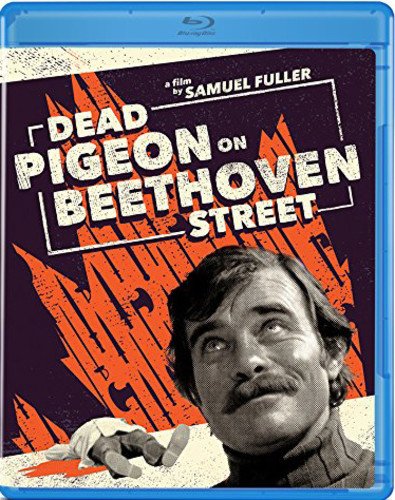
Half a rollicking, goofy near-parody of noir and half a queasy, German New Wave-inflected portrait of futility, Dead Pigeon on Beethoven Street (1972) is a singular film from iconoclastic director Samuel Fuller. Dead Pigeon is actually an episode of the (still-running!) German television series Tatort, though it was also granted a theatrical release in several countries, making it Fuller’s only feature-directing credit of the decade. Olive Films presents the restored director’s cut on a stellar new Blu-ray release.
Watching Dead Pigeon on Beethoven Street will make you wish Fuller had directed an entire season of a crime procedural. His episodic, tonally fluid approach would be perfect for at least a 13-episode order, and naturally, far more interesting than the typically rote crime drama, though Dead Pigeon works just fine as a standalone film.
Fuller integrated himself into the show’s mythology by quickly dispensing with one of the show’s protagonists (Sieghardt Rupp’s Kressin) and focusing instead on Sandy (Glenn Corbett, who made his feature-film debut in Fuller’s 1959 crime thriller The Crimson Kimono). Sandy’s an American private eye whose partner ends up as the titular dead pigeon, murdered for possessing incriminating photos that could lead to a massive blackmail ring. He also barely rises above the level of an incompetent fool, and Corbett’s hammy, lopsided performance perfectly captures the character’s bumbling brazenness.
Sandy falls in with Christa (Christa Lang, Fuller’s wife), a key figure in the crime ring who helps drug foreign government officials before taking compromising photos of herself with them. Sandy’s mostly nonsensical plan involves drugging Christa so he can pose as a rival pornographer/blackmailer, but it’s good enough to attract the attention of head honcho Mensur (an urbane, sneering Anton Diffring). Despite that whole roofie incident, Christa is amenable to a partnership with Sandy that seems destined to eventually go south.
Scored by Krautrock legends Can, who repeatedly use a slurred, spaced-out rendition of “Vitamin C,” the film features some of Fuller’s terse, forceful camerawork and editing, but is mostly a looser affair that revels in its own weirdness. It’s a must-see for Fuller fans.
Olive’s Blu-ray presents a 1080p transfer sourced from a new restoration performed by the UCLA Film & Television Archive, with additional restoration performed by Olive Films. This is the film’s director’s cut, and runs about 25 minutes longer than the TV and theatrical versions. Listed as a 1.33:1 aspect ratio, the film actually looks a little wider — around 1.40:1.
Olive’s transfer is very strong, presenting an image that’s sharp and clear, with colors that are rich, despite the film’s naturally somewhat desaturated look. A few flecks of dirt, scratches and speckles are visible, but they’re minor. The 2.0 DTS-HD Master Audio soundtrack is a little flat, likely owing to the low-budget production method, but it’s reasonably clean. Optional English subtitles only cover the English dialogue; the (sporadic) bits of German go untranslated.
The disc also features an incredibly thorough extra: Return to Beethoven Street: Sam Fuller in Germany, a two-hour documentary that approaches the film from both a behind-the-scenes and an analytical standpoint, and includes interviews with a host of collaborators and admirers, including Christa Lang, co-stars Eric P. Caspar and Hans-Christoph Blumenberg, Can founder Irmin Schmidt, filmmakers Wim Wenders and Dominik Graf, and scholars Janet Bergstrom and Bill Krohn. Essays by Lisa Dombrowski and Samuel B. Prime are also included as both on-screen text features and in a printed booklet. A trailer rounds out the extras.